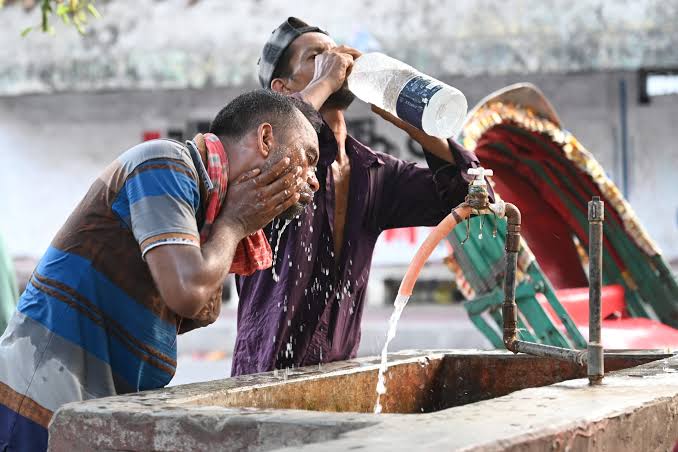02/10/2026

57m Bangladeshis endured ‘risky’ heat this summer
Staff Correspondent | Published: 2025-09-17 23:18:28

At least 57 million people in Bangladesh – over a third of the population – were exposed to dangerous levels of heat in June-August this year, with nearly half of them suffering additional days of extreme temperatures directly caused by climate change, a new global study has found.
The report by international research organisation Climate Central, released Wednesday, ranks Bangladesh 10th worldwide for heat exposure between June and August.
It says 34% of the country’s population endured more than 30 days of “risky” heat, defined as hazardous to human health. Of these, 30 million people faced an extra month of such heat attributable solely to climate change.
The findings highlight how major cities bore the brunt of the crisis. Rangpur experienced the sharpest anomaly, averaging 0.9°C above normal, and led with 37 days of risky heat – 24 of them linked to climate change.
Dhaka saw 52 days of excessive heat, including 15 risky days tied to climate change, while Chattogram logged the highest number of climate-driven heat days nationally at 59. Khulna, Rajshahi and Gazipur also endured double-digit rises in dangerous heat days.
Globally, the analysis found that one in five people – about 1.8 billion – experienced heat strongly influenced by climate change daily this summer.
Nearly 955 million people worldwide experienced more than 30 additional days of dangerous heat, with Europe and Asia being the worst hit.
Dr Kristina Dahl, vice president for science at Climate Central, said, “This analysis confirms that the impacts of climate change are no longer a future threat – they are happening now. Extreme heat is already affecting human health, economies, and ecosystems. Delays in reducing carbon emissions will only increase risks and suffering.”
The study also warns of knock-on effects: Europe endured its worst wildfire season on record, Canada its second-worst, and the United States was battered by catastrophic flooding.
Even colder nations such as Finland and Norway saw record-breaking heatwaves.
Bangladesh’s experience, the report stresses, illustrates the acute vulnerability of countries on the frontline of climate change – where rising temperatures are compounding health risks, straining cities, and amplifying natural disasters.
Editor & Publisher : Md. Motiur Rahman
Pritam-Zaman Tower, Level 03, Suite No: 401/A, 37/2 Bir Protik Gazi Dastagir Road, Purana Palton, Dhaka-1000
Cell : (+88) 01706 666 716, (+88) 01711 145 898, Phone: +88 02-41051180-81